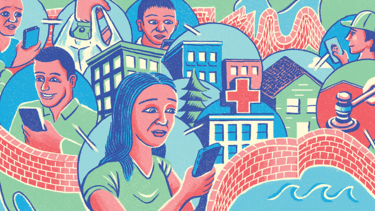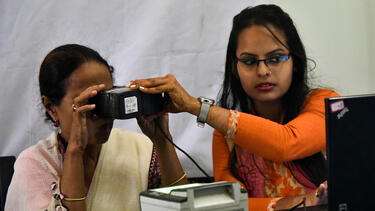Technology
How Shadow Banning Can Silently Shift Opinion Online
In a new study, Yale SOM’s Tauhid Zaman and Yen-Shao Chen show how a social media platform can shift users’ positions or increase overall polarization by selectively muting and amplifying posts in ways that appear neutral to an outside observer.

Can We Protect Our Election from the Bots?
More than 50,000 Russia-linked bots were active on Twitter during the 2016 election. Are they back? We talked with Prof. Tauhid Zaman, who has carried out a series of studies identifying bot networks and assessing their impact.

What’s the Danger from TikTok?
In September, under pressure from the Trump administration to sell its U.S. operations, the Chinese-owned social media app TikTok tentatively agreed to partner with Oracle. We asked Prof. Paul Bracken, an expert on strategy and technology, about the security threat from Chinese technology companies and how the conflict might play out.

The Borderlessness of Tech-Driven Media
Dayo Olopade ’15, a lead for film and television partnerships at Google, discusses the global disruption of production, distribution, and consumption of media around the world.

Facebook’s Dominance Is Built on Anti-Competitive Behavior
In a new paper, Yale SOM’s Fiona Scott Morton writes that the company took control of the social media industry by misleading consumers and buying up rivals.

An App as a Lifeline for Immigrant Communities
Laura Arrazola ’19, a graduate of Yale SOM's Master of Advanced Management program, describes her experiences managing a virtual community that helps hard-hit immigrants navigate the pandemic.

The Antitrust Case against Google
State and federal authorities are reportedly preparing to bring antitrust charges against Google. We talked to Yale SOM’s Fiona Scott Morton about the company's dominant role in online advertising and how it limits competition.

A Vast Experiment in Remote Work
Scott Wharton ’95, who leads Logitech’s video collaboration group, sees far-reaching and sustained changes from the remote work explosion forced on us by the pandemic.

What Happens When a Billion Identities Are Digitized?
The success of India’s Aadhaar, a biometrically secured national identification system, has ignited a debate over whether any entity, public or private, should have the ability to pool our full digital profiles.

Are Electronic Health Records Useful Yet?
The story of EHRs serves as a prelude to what we’re experiencing today in almost every facet of our lives: a utopian promise of ubiquitous data tempered by technical challenges and concerns over privacy.

How Machine Learning Can Find Extremists on Social Media
Yale SOM's Tauhid Zaman investigated how artificial intelligence could assist efforts to detect and suspend extremist accounts, before they are used to recruit members and spread propaganda.
